By Bridgett M. Davis
In the early 1920s, Casper Holstein, a black man from the Danish West Indies who worked as a porter for a Fifth Avenue store, liked to study the "Clearing House" totals published in a year's worth of newspapers he'd saved. The Clearing House was an operation that managed the exchanges of money among New York City banks on a daily basis. It occurred to Holstein that the numbers printed were different every day.
Until then, lottery games existed, but the winning numbers were often chosen in unreliable ways that could produce rigged results. According to the 2010 book "Playing the Numbers," Holstein came up with an ingenious solution. Using the Clearing House totals to produce a random combination between 000 and 999, he came up with a daily three-digit winning number for a new kind of lottery game. His invention became known simply as the numbers.
It was an immediate hit and quickly created a sprawling underground economy that moved through Harlem and other black communities in the U.S. For 60 years, the numbers reigned supreme as New York City's pre-eminent daily lottery game — until 1980, when the state decided it wanted in.
In Detroit, my own mother, Fannie Davis, ran a numbers business for 34 years. That business provided us, her children, with a solid middle-class life, including a spacious family home, beautiful clothes and college educations — and, thanks to our inheritance, generational wealth. While the numbers were illegal, and therefore had to be kept a secret, I knew about another girl with a parent who ran numbers: Her name was Francie and she lived in Harlem, and she was real to me, even though she was in fact a character in a book.
When I was 10, my mom gave me a copy of Louise Meriwether's novel "Daddy Was A Number Runner," a fictionalized account of the author's life in 1930s Harlem, where the numbers helped sustain black folks through the Great Depression, when lucky players could turn a hard-earned nickel into $30. The book, published in 1970, has a foreword by James Baldwin, who wrote, "the metaphor for this growing apprehension of the iron and insurmountable rigors of one's life are here conveyed by that game known in Harlem as the numbers, the game which contains the possibility of making a 'hit' — the American dream in black-face, Horatio Alger revealed, the American success story with the price tag showing!"
I recently reread Meriwether's book — still in print thanks to the Feminist Press at the City University of New York — and her story helped me remember how vital the numbers were to black life. But The New York Times archives enlightened me about the fight of the city's black elected officials, activists and everyday people to preserve this cultural and economic institution — and how much was lost when New York State usurped the game.
Much of that loss was jobs. In 1971, The Times reported that an estimated "60 percent of the area's economic life depends on cash flow from the numbers," which employed an estimated 100,000 workers across the five boroughs. Numbers men also in many ways filled the void left by a formal economy indifferent to black residents' needs: They bankrolled many small businesses, from bars to restaurants to corner groceries, and also saved many businesses from bankruptcy. These bankers helped get out the vote, buttressed black civil rights groups and contributed to black political candidates' campaigns.
Numbers money provided a foundation from which stellar careers could be launched in everything from athletics to public service to entertainment. Colin Powell's father bought their family home with proceeds from hitting the Number. Harry Belafonte's Uncle Lenny ran a numbers racket and was an early example of success for the singer. The singer Lena Horne's father, Teddy, was a numbers operator. Stephanie St. Clair, known as Madame Queen, was one of the only women to run a successful numbers game in Harlem in the 1920s and 1930s, and became both an activist and major black employer. Such figures were often pillars of the community.
As early as 1971, when off-track-betting interests were looking to move in on the numbers action, Harlem activist James R. Lawson testified in favor of maintaining local control of the game before a legislative committee. "We intend to run it, come hell or high water," he said.
Six years later, Lawson proposed, in a radio address directed at Gov. Hugh Carey, that black and Hispanic numbers bankers buy franchises for 4,000 state-licensed numbers operations; the goal was to ensure that African-Americans benefited from a sanctioned lottery rather than fall victim to a "poor tax" burden. Yet Lawson and other black leaders, U.S. Congressman Charles Rangel among them, were not ultimately successful.
By 1980, the street-run business in New York was generating an estimated $800 million to $1.5 billion a year. That's why when lawmakers in Albany proposed a similar, daily pick-three lottery that year, a coalition of city and state officials feared there would be a crackdown on the numbers, and tried to stop the move. If the traditional numbers game could get legalized, the revenue could circulate in the black community and numbers workers could be legitimized and keep their jobs.
To the largely white Assembly — as the City College of New York historian Matthew Vaz has pointed out — the black and Hispanic participants in the numbers game were merely tax evaders and criminals. Also, New York legislators sold the public on the notion that a state-run version of the lottery would funnel a portion of the proceeds to education. This anticipation of lottery revenue, by the way, prompted New York legislators to reallocate education funds to other parts of the state budget.
Still, folks tried to fight back and marched through the streets to Gov. Carey's New York office. A sign posted in a Harlem Numbers parlor asked, "Does Gov. Carey knows How Many People Are Working In the Numbers Industry. He is Sending Our Families Back to Welfare. We don't Want Welfare. We Want Our Jobs."
Nevertheless, the state-run daily lottery began in September 1980, and in subsequent years the numbers game mostly faded away.
In most of these photos you see the criminal aspects of the numbers, rather than the everyday-ness — the communal, reciprocal and congratulatory qualities. Only one image captures the whimsically designed "tip sheets" used to help players choose a number to play. Another captures Old Aunt Dinah's Dream Book of Numbers, and Gypsy's Witch Dream Book of Numbers, two of many simple yet illuminating publications used as bibles for numbers players. These encyclopedic books interpreted dreams by assigning three-digit numbers to different symbols, and nearly any image or experience that could appear in a dream.
Dreams were everything to numbers players, just as dreams have deep significance in black culture. Many black folks believed when they dreamed about something specific, that spirit was blessing them with a certain number to play. This is one key way that the Numbers is intricately connected to black folks' larger sense of hoping for a better future, of getting closer to achieving the American dream.
The New York State Lottery Commission seemed to understand this, eventually adopting the slogan "All You Need Is A Dollar And A Dream." But by then, Harlem had known that for decades.
Bridgett M. Davis is the author of "The World According to Fannie Davis: My Mother's Life in the Detroit Numbers."
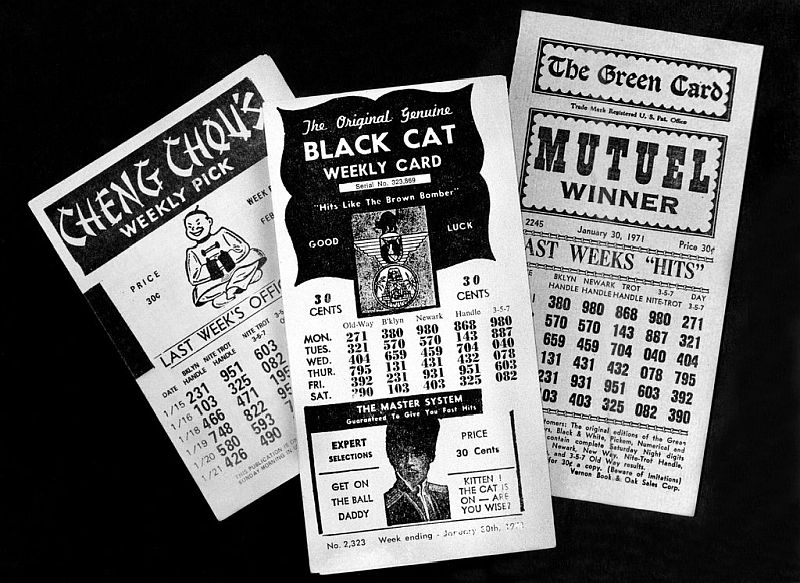 (Click to display full-size in gallery)
(Click to display full-size in gallery)
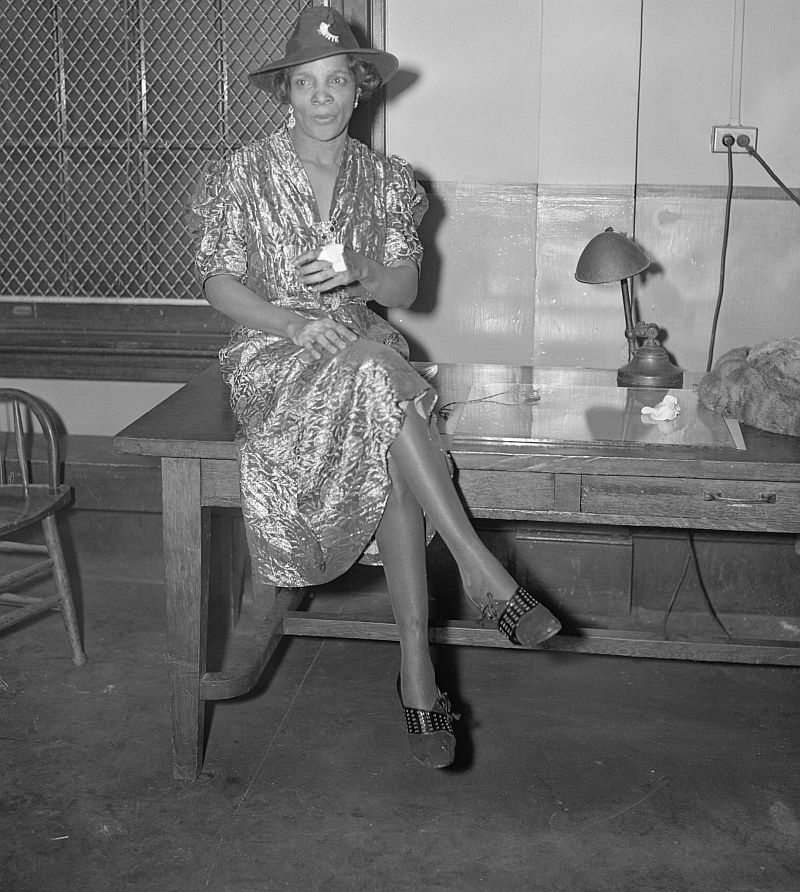 (Click to display full-size in gallery)
(Click to display full-size in gallery)
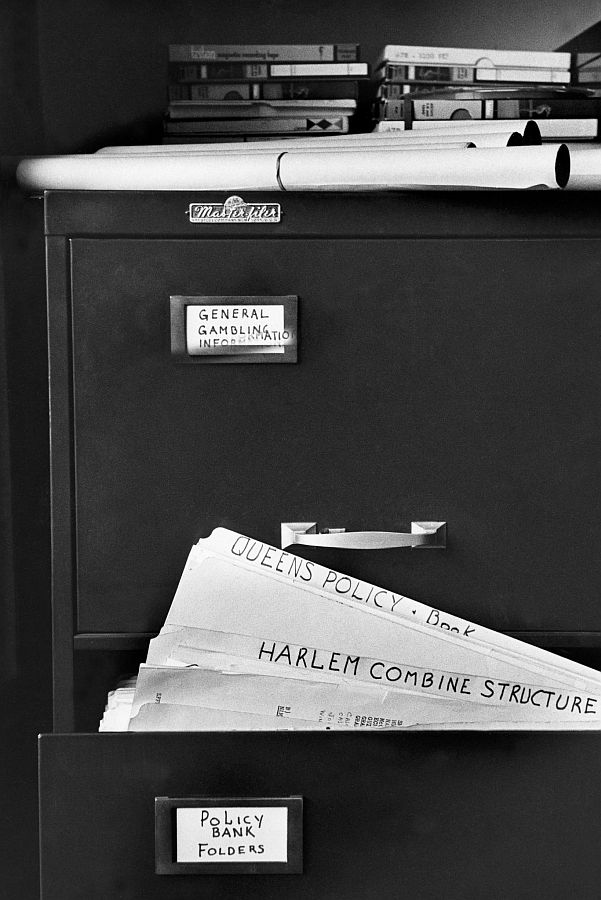 (Click to display full-size in gallery)
(Click to display full-size in gallery)
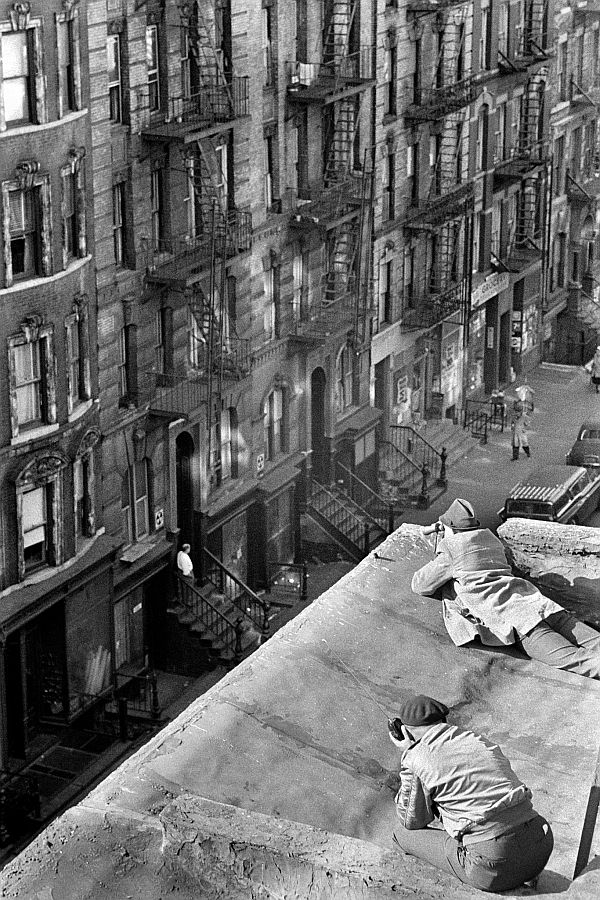 (Click to display full-size in gallery)
(Click to display full-size in gallery)
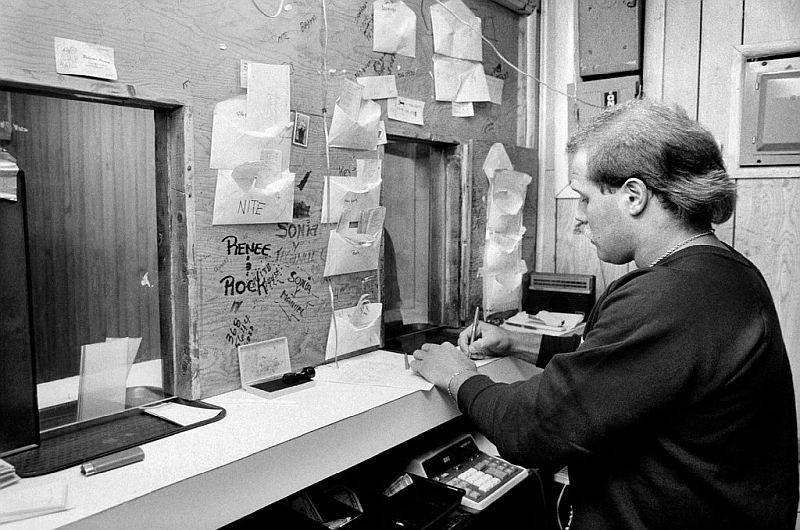 (Click to display full-size in gallery)
(Click to display full-size in gallery)




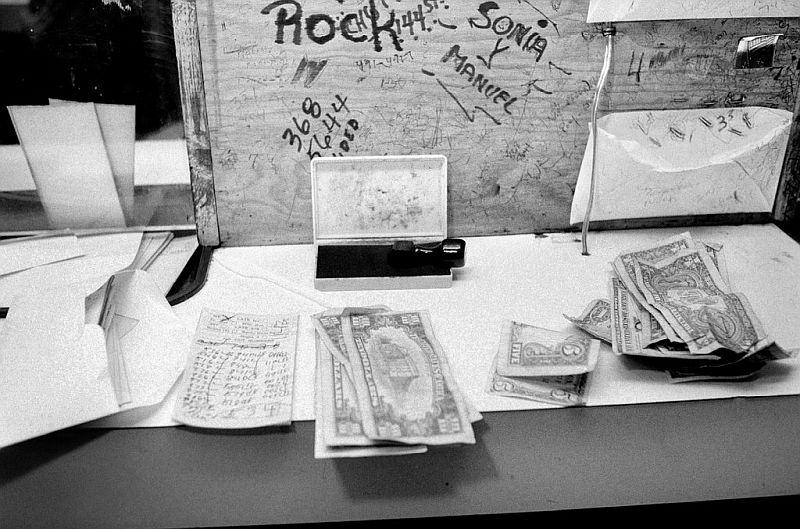
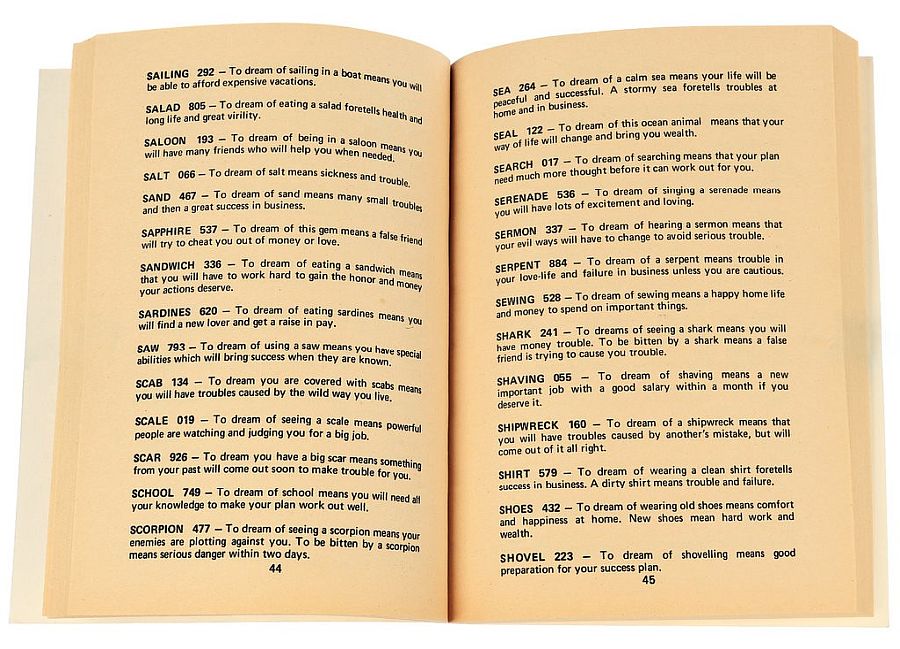
Good article Todd.
The game was also called "policy".
My Grandfather had a Candy store in the Bronx ( Arthur Ave ) booked Numbers He never bet himself and never got arrested. He made a great living . He would open the store early in the morning take the numbers and close the store at noon. He would come home and go into the bedroom and listen to the races on the radio. Go back to the store around 4 paid out whoever won and book some more numbers .
Nydebbie,
My father always said there wasn't a candy store or a news stand on the East Coast that could survive without 'numbers.
He used to play at one that was across the street from a Catholic church. So he goes to play one day,l there's the guy who runs the store, a cop, and a priest. All three start looking through magazines, the priest leaves then the cop leaves. The guy that ran the store was cracking up. My father asked him what was so funny and he said, "The priest and the cop were here for the same reason you are, what number do you want to play?"
Interesting news story on the history of the lottery!
Thanks Todd, for the great lottery history lesson!!!
My late parents had a business on the Lower East Side in Manhattan. There was a guy who would go around taking numbers. Back then they paid $600 on a $1 bet.
Every year, when it was time for my brother to come home from college for the holidays, my Mom would hit a number straight for $600 (less a 10% [$60] tip). She then had $540 to pay for the airplane ticket plus lots of $$$ left over.
You didn't have to bet 50 cents or $1 on a number. They took bets for as little as 10 cents.
the bookmakers used to use the first 3 horses across the aqueduct race track finish line in the 9th race.
Yep. The aqueduct was the one.
I thought they used the last three numbers of the track handle. The track handle was the amount of total bets wagered on the races.
I suppose that each bookmaker used different ways to come up with their "winning numbers"
I going to make you laugh . When I used to go to the store with my father . I would see a few customers in it. I would ask my father how he makes money . My father used to laugh. I never knew what he really was going until I was in High School.
Happy belated Black History Month!! Great Story!!
Great Story!!
Awesome article Todd!
Great article and the Government, as usual, had to put their hands in the till.
Speaking of lotteries, wonder if Todd et al across the Hudson won NJ Mega Millions last night?
Very interesting.
Awesome Black History
My daddy played the numbers and I never knew. I too started playing when I was 18 and I would hit a lot and tell my daddy and he would just laugh. He never told me he used to play My moms sister told me and a friend that used to ply with her father. Government always go to get their hands in something and tax the heck out of big wins. I had a friend now deceased who hit for 20 thousand one time tax free
Yes they did you are right, but after a while there were two daily numbers ... one was called "The Handle" and the other The Old Way. My next door neighbor ran numbers back in the day .. nice lil old lady. I got introduced to the game waaaaay too young ... remember my late parents betting 60 cents straight 40 cents box on numbers!!! I remember that lady getting arrested and couldn't attend my sister's wedding because she was locked up! Wow, the memories ... Thanks Todd!
There was a guy who use to visit our home a couple of days a week. When we were younger, my parents would say he was "the insurance man". When we grew older we learned, he was the " numbers man". They also said the numbers came from racing results but different late races.
Interesting read.
The numbers list has not changed numbers follow same set of numbers.
I Thank God for the Number Spots Years gone by.What would black people do today. Now is $900.00
To $1.00 That is History Harlem History We must go on Forever.Poor people live like that.
Good Article, well the many pick 3's and pick 4's utilized the "box", option is some ways paying homage to the "Numbers", game.
nothing hAS change just the people new people in the game.
Yep.
I use to play the numbers once in awhile back in the 60s and 70s.
The guy use to run a coffee truck that came through the development where we built houses. Go out for my morning coffee and snack and play a number.
Litebets27,
That's one of the reasons (probably the best) why the game was also called policy.
///////////////
Re: the number coming from race traxks.....
The bookies in Northern NJ used to use the last three dollar digits of the total mutual handle at racetracks............the racetracks were rotated to avoid any possible collusion.
I remember!!! I remember when the state ( New York State) wanted in!!! my mother had a number runner come to pick up her pink slip filled out with 2 and three digit numbers and when the number hit( came out) her guy would come and pay her. Playing the numbers back then was illegal. ILLEGAL because the state wasn't getting paid. Needless to say they found a way to get a piece of the pie. Thanks for the article ! I never actuality knew how playing numbers were originated .
There you go
That is why it was always important to get the newspaper the following day to make sure the insurance man, (number man) was going to come by and pay up.
Very cool story.
I know Matthew Vaz. I grew up with him. He’s a good guy. Gosh ain’t caught up with him in years.
Hello did you know what we call pairs , They call it
Bolitas. And they pay way more than the State.
Exp: 98 str$.$1.00. $1.00 Combo. Pays $80.$8.
Plus $40. For Combo .Total of $80+$40 =$120.00
When you have Children to feed .And need fast Buck. That was Harlem Bank. The Numbers is Everyone's game.